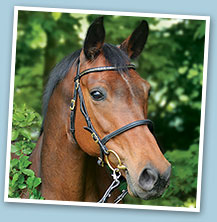
Press room
2014 press releases
Posted: 13/01/14
The good the not bad and the ugly of foraged foods
When Petplan Equine, the UK’s leading specialist equine insurance company, asked its Facebook followers about the foraging habits of their horses they received a strong response. Around 50 respondents posted details of their horse’s particular foraged favourites including everything from thistles and oak leaves to willow rosehip and wild garlic. While some can be good for your horse, other plants lurking in our fields and hedgerows can actually be toxic and horses are not always discerning when it comes to their choices. So, the Petplan team has, with the help of Gil Riley, Petplan Equine Vet of the Year and independent equine nutritionist, Dr Catherine Dunnett, put together a helpful guide to what’s good and what’s not.
Dr Dunnett is swift to point out that foraging is, in the main, beneficial. "Foraging in horses is to be encouraged – it’s a very natural behaviour- but whilst some plants such as thistles may be harmless and could even be beneficial, others can be a hazard. You do really need to be well informed on what you horse is tucking in to when they ingest leaves, seeds and some pasture weeds as they may harbour serious toxins – the obvious example being the recent link made between the seeds of certain Acer trees and equine atypical myopathy a life threatening muscle related condition" she clarifies.
"The decision to investigate this topic further came from a discussion we were having here in the office about the habits of our own horses" explains Charlotte Collyer, marketing executive with Petplan Equine.
"It became clear that some horses had definite favourites and that their owners didn’t always know which were safe and which weren’t. So this project aims to provide horse owners with accurate information about this subject" she says.
"Some people believe horses will avoid poisonous plants unless there is simply nothing else to eat in their field – this is not always the case”, explains vet Gil Riley of Pool House Equine Vets in Staffordshire. Conversely, some believe horses seek out plants that they ‘need’ such as Willow that contains salicylic acid, a naturally occurring form of aspirin or rosehips that are believed to have anti-inflammatory properties. While there may be some truth in both instances, it is most likely that horses browse the plants that have a taste that they like. A good example is oak leaves and acorns, the latter is toxic and has particular adverse effects so if your horse appears to like acorns it must not be allowed near oaks when they are dropping them" emphasises Gil.
The following table provides, at a glance a guide to those that are toxic, non-toxic and good.
| Toxic | Non-Toxic | Good |
| Yew - small amount - FATAL | Dandelions | Rosehips |
| Mallow | Clovers (in moderation) | Blackberries |
| White (Aliske) clover | Blackthorn but beware | Wild Garlic |
| Ragwort - HIGHLY | Thistles | Hawthorn |
| Cherry | Gorse | Willow |
| Acorns | Brambles | Cow Parsley |
| Field Horsetail | Wild Camomile | Chalk Stream (watercress) |
| Goose Grass (Cleavers) | ||
| Wild Celery | ||
| Coarse Grass | ||
| Plantains | ||
| Nettles |
The table shows that there are many more non-toxic or good forages to be found in our fields and hedgerows than bad ones, but to be absolutely sure you know what your horse is eating and whether it’s good for them and safe to eat visit www.petplanequine.co.uk/foraging where you will find a photograph of each plant and more detail.
For more information please contact:
| Name | Telephone | |
| Charlotte Collyer | 0208 707 8335 | charlotte.collyer@allianz.co.uk |
Petplan Equine is the UK's leading horse insurance provider offering a wide variety of flexible horse insurance and rider insurance policies which cater for all levels of experience.
Established more than 20 years ago, Petplan Equine is part of Allianz Insurance, one of the largest general insurers in the world.
For more information about a Petplan Equine horse insurance policy, please visit:
petplanequine.co.uk/insurance/quote.asp
Note to editors:
- Petplan Equine was founded in 1988.
- It is part of Allianz Animal Health, the largest provider of animal health insurance in the world and part of Allianz – one of the largest general insurers in the UK.
- In addition to horse and pony insurance options, Petplan Equine provides dedicated products for veteran horses and rider only insurance cover.
- It is the sister brand of Petplan, the largest provider of small animal insurance in the UK.
- Petplan Equine believes in supporting the equine community and provides more financial support to equestrian sports and activities than any equine insurance provider in the UK.
- The Pet Plan Charitable Trust was founded in 1994 to raise much needed funds for animal welfare and veterinary projects. Money is raised by Petplan and Petplan Equine customers giving an optional £1.50 to the Trust when they take out or renew their policy. To date, almost £5 million has been awarded by the Trust.
- Petplan and Petplan Equine are specialist insurers. As such, the company employs more horse riders and owners than any other and more former veterinary practice staff than any other to ensure the provision of specialist knowledge.
- Redwings Horse Sanctuary is the UK’s largest horse sanctuary, caring for over 1200 rescued horses at its nine sites around the country, with 500 more living in happy Guardian homes across East Anglia. The charity is entirely funded by public donation. Find out more at www.redwings.co.uk.



